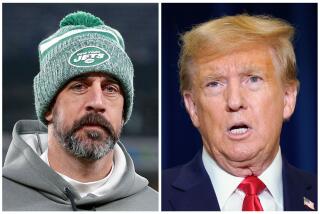Should Courts Fix Blame for Tobacco?
- Share via
In this age prone to simplistic solutions, it is not surprising that our judicial system is being asked to assess absolute liability to tobacco companies for the ills of smoking.
John Galbraith smoked two packs of cigarettes a day for 50 years. He died in 1982, at the age of 69, of emphysema, cancer and heart disease. His family, represented by Melvin Belli, is suing R.J. Reynolds Tobacco Co. for wrongful death under California’s product-liability law.
Belli claims that he will prove a direct link between cigarette smoking and the ailments that caused Galbraith’s death. He argues that his client became addicted before Congress imposed warning labels on cigarette packages in 1966, and so the warning should not prevent his clients’ recovery. The tobacco industry has never lost a case on these or any other theories. Furthermore, defense attorney Thomas Workman responds that Galbraith’s parents and a brother, all nonsmokers, died prematurely of similar heart and lung problems, casting some doubt as to whether smoking was the cause of his death.
Whatever the specific facts of the Galbraith case may be, there may now be ample factual grounds to conclude that smoking annually causes or contributes to the premature deaths of hundreds of thousands of smokers. It has been estimated that the annual damages attributable to smoking, including medical costs and lost earnings, are in excess of $6 billion. Smoking also invades the rights, and may impair the health, of nonsmokers. In short, few can doubt the ills of smoking.
But are we ready as a society to free the individual of the consequences of his own actions and decisions? If the tobacco producers are to be held liable for the medical costs and lost earnings of smokers, is the liquor industry to be held liable for alcohol problems? Are pharmaceutical companies to be responsible for drug abuse? Are fast- food outlets and dairy farms to be responsible for cholesterol-related heart failure?
While these manufacturers rarely experience a specific product defect, such as a dangerous pesticide in tobacco, an errant drug formula, tainted hamburger meat or spoiled eggs, they do share a common characteristic. Each manufactures a product with inherent attributes that may cause or exacerbate health problems in some people. A carcinogen in tobacco is not caused by a defective manufacturing process, nor is alcohol in liquor, nor cholesterol in eggs or hamburgers.
As a society, we are not faced here with correcting a faulty production process. Rather, we must decide whether to allow these products to be manufactured and sold; whether to restrict, regulate or tax their use; whether to impose strict liability for any damage due to their use or abuse, and whether to allow or require individuals to assume the risk of those damages. In the case of cigarettes we must also decide if the publication of the Surgeon General’s warning absolves the tobacco companies of any or all liability to smokers on the theory of caveat emptor , “let the buyer beware.”
Curiously, the legislative branch of government has remained silent about these important societal choices, leaving the courts to deal with them on a piecemeal, case-by-case basis. R. J. Reynolds, with less than a 10% share of the $60-billion-a-year U.S. tobacco market, alone is a defendant in 35 cases. Should any tobacco producer lose a single case, it can be assumed there will be thousands of cases filed in every state. It promises to be an expensive, slow and uneven way to address the problems, taking a generation or more before any cohesive social policy evolves. Even worse, should damages be awarded, more of the money will go toward the costs of trial than to victims.
To date, all that Congress has done, other than impose warning labels, is to vote year after year to continue subsidizing tobacco production. Clearly, there are other options. It could ban the sale of cigarettes, but given our experience with Prohibition and because we highly value personal freedom and responsibility, this would be unwise, unenforceable and, thus, unlikely. Congress could, on the other hand, hold its own hearings to determine what most people suspect--that cigarettes are a contributing cause of cancer and other health problems. It could then resolve to set aside sufficient revenue from cigarette taxes so that smokers and the tobacco industry would have to bear the burden of the damages of smoking. How such a program might be designed and administered would appear to be a legislative and not a judicial matter.
Judicial promulgation of product-liability law has not worked. The system has all too often rewarded needy plaintiffs rather than awarding damages from true product defects. The predictable consequence has been that product-liability insurance premiums have skyrocketed and coverage of many risks is simply unavailable. Meanwhile, obliviously, the courts continue to liberalize the grounds for liability, and jury damage awards continue to mount.
The issues facing the U.S. tobacco industry and 54 million smokers warrants a solution. Congress should not wait for judicial resolution to unfold.
More to Read
Inside the business of entertainment
The Wide Shot brings you news, analysis and insights on everything from streaming wars to production — and what it all means for the future.
You may occasionally receive promotional content from the Los Angeles Times.










